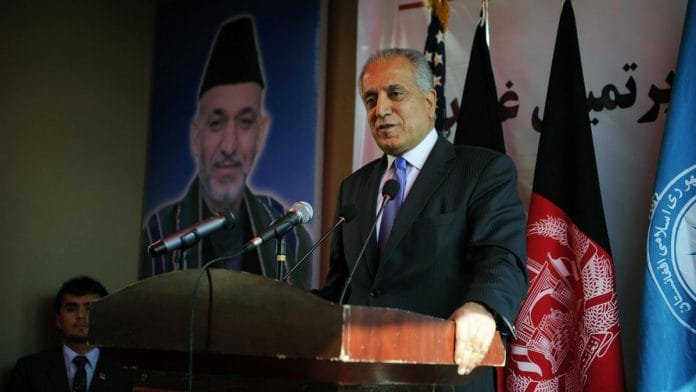New Delhi: During his visit to India next week, US envoy for Afghan peace talks Zalmay Khalilzad may urge New Delhi to not oppose the creation of an interim government in Kabul as he looks to expedite a settlement with the Taliban for withdrawal of American troops, diplomatic sources told ThePrint.
Khalilzad, who is set to visit India from 6-7 May, will inform India about the current state of play in the negotiations with the Taliban and the evolving situation in Kabul, where presidential elections have been postponed indefinitely.
Sources said the creation of an interim government in Kabul looks inevitable now with the postponement of Afghan presidential elections till September. Khalilzad, however, faces a deadline to conclude the talks before US presidential elections approach closer.
The delayed elections come as “boon in disguise for the US” as it offers more time to Khalilzad to wrap up the talks with Taliban, said the sources.
Meanwhile, the opposition parties and presidential contenders in Afghanistan have called for an interim government as it does not want the present Ashraf Ghani government to continue, said the sources.
India has already told the US that in its urgency to pull out troops from Kabul, Washington should not help in the creation of an interim government there as it believes such an arrangement will give a free hand to Pakistan leading to “backdoor entry” of Taliban insurgents into the mainstream, added the sources.
Foreign Secretary Vijay Gokhale had clearly told this to Khalilzad when they last met in Washington in March. Gokhale had urged US that when Trump downsizes his troops, a sound political structure should be in place at that time, said a government official who didn’t wish to be named.
Khalilzad is scheduled to meet External Affairs Minister Sushma Swaraj Tuesday.
Also read: Pakistan would not benefit from a Taliban govt in Afghanistan contrary to popular belief
Ghani government gets extension
The term of the present Afghan President Ashraf Ghani was to expire on 22 May. However, last month Afghanistan’s Supreme Court ordered an extension of his term due to issues related to electoral reforms and a deteriorating security environment.
Meanwhile, the US and Taliban resumed a fresh round of peace talks on 1 May in Doha. The talks were almost on the verge of collapsing last month when Taliban refused to come to the negotiating table that included representatives of the Afghan government.
“Under the present circumstance and the situation that is evolving there, India has no choice but to accept an interim government there. After all, it is their internal matter,” said Rakesh Sood, former Indian ambassador to Afghanistan.
“The Ghani government couldn’t deliver on the electoral reforms it had promised and the security situation there is deteriorating everyday.”
Sood, who is also a Distinguished Fellow at the Observer Research Foundation, said, “Sooner or later there has to be an interim government that will be placed there as the Ghani government cannot continue extending its period and neither can Khalilzad stretch it beyond a point.”
Indian concerns
India is also concerned that the Afghan government has been kept out of the Taliban peace talks since the beginning. New Delhi is worried that with Islamabad playing a role as a facilitator in the talks, the security situation in the region may deteriorate further.
Last year, India had sent two of its former diplomats, Amar Sinha and T.C.A. Raghavan, as non-official representatives in Russia for the Moscow talks with the Taliban to understand how the talks are progressing.
The settlement accord that the US is seeking with the Taliban focusses mainly on four issues — troops draw-down, end of terrorist activities, political settlement and a lasting ceasefire.
“Khalilzad’s visit will be crucial for us as this will give India as readout of what’s happening in the talks. We need to know the state of play there. We should be kept abreast of what is transpiring in these talks,” said Vivek Katju, former Indian ambassador to Afghanistan.
Also read: India being kept out of Afghan-Taliban peace talks is a return to pre-9/11 geopolitics







For all the claims that may have been made on the successes of Indian foreign policy, starting with the immediate neighbourhood, the gains are quite slender.